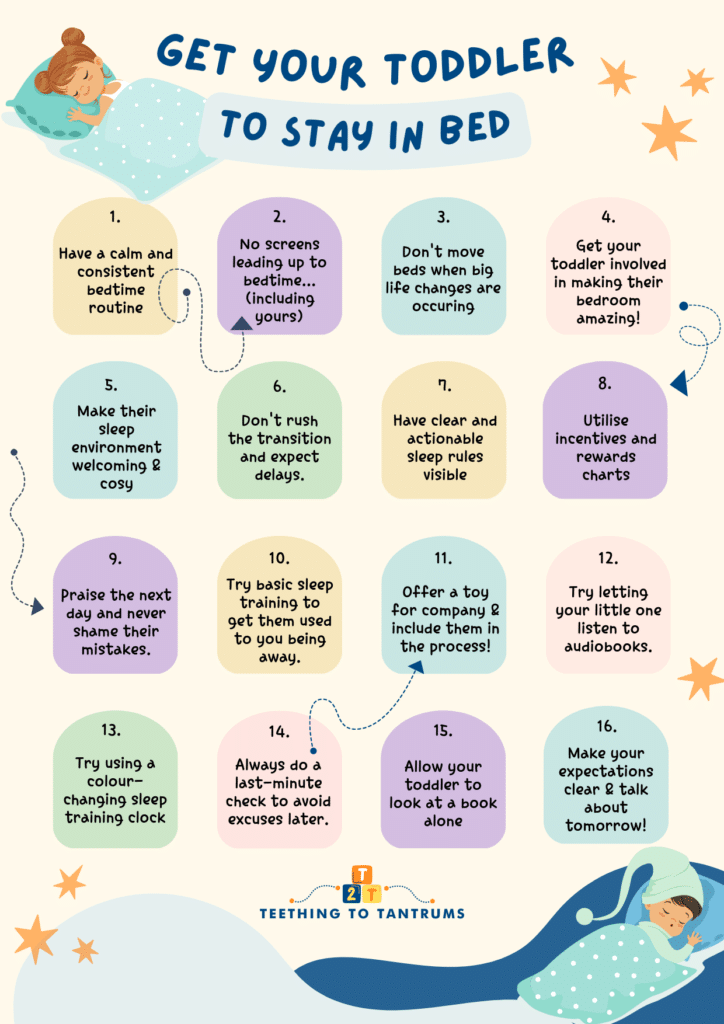Are you a parent who’s recently transitioned your little one from a crib to a bed, only to find that your toddler keeps getting out of bed and refusing to stay put? It can be a frustrating and exhausting experience, but fear not! As a Norland Trained Nanny, I’ve got some tried and tested hacks that actually work.
With 40 years of parenting wisdom and experience, this jam-packed article is filled with tips and tricks to help your toddler transition to their big bed with ease. Don’t let bedtime become a ping pong game – read on to discover how to teach your toddler that once they’re put to bed, that’s where they need to stay.
5 Reasons Why Your Toddler Keeps Getting Out Of Bed
Toddlers get out of bed for several reasons and identifying the reason will determine how you deal with it. If your toddler keeps getting out of bed, here’s why it may be happening:
1. Because They Can
This is the most common reason toddlers get out of bed, and in a way, you can’t blame them for it!
In a ‘big bed’, your toddler has the freedom to get out without barriers, meaning they can come and find their favourite person… you!
2. They Lack A Consistent Bedtime Routine
Yes, that bedtime routine again.
Having a calming, regular bedtime will go a long way to teaching your toddler to stay in bed.
If they have always settled well in their crib and gone to sleep quickly until now, then there is a good chance they will do so now.
If you have not had a bedtime routine then now is the time to establish one as it will definitely help in getting your toddler primed for sleep. To learn more about creating a calming evening routine, read my post Hacking The Bedtime Routine to discover how.
3. They’re Either Not Tired Enough Or Overtired
This is a tricky one…
If your bedtime routine and daytime naps are not consistent, you find your toddler keeps getting out of bed. Ensure they are primed for sleep by having the right amount of naps during the day to avoid overtiredness or being not tired enough.
Check out my post When Do Toddlers Stop Napping to learn more about your toddler’s nap schedule.
4. They Have Had A Bad Dream Or Are Scared Of The Dark
It is common for children around the ages of 2-3 years to develop night terrors, have bad dreams, become scared of the dark or develop separation anxiety.
This will often coincide with moving to a bed and your little one will need comfort and reassurance during this phase.
Offer lots of love and support, be patient and reassuring then settle them back into bed.
Installing a night light and lots of reassurance from you will help them deal with this perfectly natural fear. Make sure they have their favourite toy to keep them company too.
But try your best to not let your toddler join you in your bed as this will create an unhealthy sleep association that will be very hard to break!
Super soft, very cuddly and the perfect companion to young children, the GUND Teddy Bears never fail to be toy box favourites for years to come!
5. They Are Feeling Unwell
Your child may get out of bed because they are feeling unwell and need your comfort.
This is the one time when you can take them into your bed or allow them to sit with you for a while. You can also sit with your little one in their bed and cuddle together to help them feel better.
Check out my Parenting Toolbox Care Page to find a comprehensive list of items every household should have to ensure your little one stays healthy and happy when they’re feeling a bit off.
Looking to get your little one to sleep quickly and effortlessly? Check out my Bedtime and Nap Cheat Sheet and master the art of making daytime naps and bedtimes as seamless as possible.
A bedtime & nap cheat sheet so good your little one will ask you to put them to bed...
Laura Williams "This is a life saver! I'm so glad I downloaded your bedtime & nap cheat sheet. My little one actually asked me to put him to bed last night! Unbelievable! Thank you so much!"
Click Here For The FREE Cheat Sheet
16 Tricks To Get Your Toddler To Stay In Bed
There are some things you can do to preempt the matter if your toddler keeps getting out of bed in the first place. These are little tricks to help your toddler get into bed and how to motivate them to stay there all night long.

1. Have A Consistent & Calm Bedtime Routine
A regular bedtime routine will go a long way in preparing your toddler for sleep and therefore, making bedtime run more smoothly.
A toddler that is primed for sleep will be more likely to fall asleep quickly and respond well to your insistence on staying in bed.
2. No Screens Leading Up To Bedtime
Limiting screen time and reducing blue light exposure in the lead-up to bedtime is proven to help children fall asleep more quickly and to stay asleep too.
If your toddler keeps getting out of bed or struggles to fall asleep, they are more likely to get out of bed… so keep all screens off before bed (including yours).
3. Get The Timing Right
Once you have made the decision to move your little one to a bed you need to get the timing right.
Don’t let the move coincide with any big life changes such as the arrival of a new baby, moving house or starting nursery school.
Your toddler may then associate these big life changes with being in a new bed and will want to stay in your room in a cot as it’s a safe place they know and find comfort in.
4. Get Your Toddler Involved In The Transition From Crib To Bed
By getting your toddler involved in the bed transition, you are more likely to have their acceptance and commitment to it.
Allow them to be around when you put the toddler bed up, let them help choose the bedding and what toys they would like to have to sleep with them. If they feel part of the process they are more likely to embrace it.
5. Make Their Sleep Environment Comfy And Cosy
If your toddler keeps getting out of bed night after night, ensure that their sleep environment is inviting, comfy and cosy. Make sure they are not too hot or too cold and use a nightlight and or white noise machine to create a pleasant atmosphere night after night.
Finding the right night light for your child can be quite a task. You want something safe, comforting, and practical. The Cozy Starry Night Light ticks these boxes, with eye-friendly warm lighting and an easy-to-use dimmer.
Its gentle glow makes it the best night light for feeding baby, diaper changes, or comforting your little one back to sleep.
As your baby grows the Cozy Starry Night Light's starry sky projection can provide comfort and gentle quiet time stimulation. Its soft lighting ensures a dreamy, peaceful environment, supporting your baby’s natural sleep cycle.
It really is a fantastic nightlight (at a very reasonable price!)
- Eye-friendly warm lighting with adjustable brightness.
- Includes a timer function for convenience.
- Projects a starry sky that is soothing for little ones.
- Rechargeable battery, so it's very portable.
- A USB adapter is not included for charging.
- The star projector is static without motion (however, this is ideal for very young babies and toddlers).
- Battery life varies based on the brightness settings.
White noise machines are a game-changer for your little one's sleep and having one that plays all night is a must. With a long-lasting battery, this compact and stylish white noise machine contains 21 non-stop relaxing noises, which will lull your little one to sleep night after night, no matter where you are!
NOTE: Do not shut the bedroom door as a solution to keeping your toddler in bed. This is far too harsh for young children and is very likely to make them more anxious and upset rather than help them learn to stay in bed.
6. Don’t Rush The Process
Take your time over the big bed transition. Don’t expect your toddler to happily fall asleep in their new bed on the first night.
You may have to lie with them for a while and then over successive nights with positive reinforcement, remove yourself gradually from the bed until they eventually fall asleep without you present.
7. Have Sleep Rules
Having a poster with the sleep rules laid out in picture form can help keep older toddlers on track and you can refer to it when your toddler keeps getting out of bed. The picture rules should be clear and simple and in an easy-to-see place at toddler height.
8. Utilise Incentives And Reward Charts
Having a reward chart or sticker chart that you can fill in the next morning after a successful night can be a great incentive for your little one.
A reward being offered after 3 or 5 nights of not getting out of bed has been achieved is a wonderful motivator.
Avoid giving sweets as a reward and rather go for a special outing or much-loved activity instead. You can have a selection of rewards and let your toddler choose from a couple of options so that they can feel more in control of the outcome.
9. Praise The Next Day, Don’t Shame
If your toddler has had an unsuccessful evening and or night of getting out of bed, then do not refer to it the next day. Instead, say nothing at all.
Ignore the bad behaviour and don’t shame them for getting out of bed. You don’t want to encourage this behaviour to happen again but equally, you don’t want your toddler to be terrified to get out of bed when they really need to (ie: being sick)
However, if they have managed to not get out of bed at night then praise them the next morning and tell them how proud they should be!
10. Try The “I’ll Check Back” Technique
In the early days, when your toddler keeps getting out of bed… they may need a helping hand to stay put. Therefore, try the “I’ll be back” sleep training technique.
This involves staying with your toddler for a little while then finding a reason for having to leave them for a short while to go and check on something but assure them that you will be back shortly.
It is important that you always come back as promised.
Gradually extend the time that you leave them alone over the next few nights until eventually, they have fallen asleep before you’ve returned.
11. Offer Them A Toy For Company
Your toddler will often find the company of a favourite toy will help them feel safe and fall asleep more easily.
Let them choose who gets to share their bed and use words of encouragement such as “I am sure Teddy is ready to sleep after such a busy day, shall we read him a story?”.
Then kiss your toddler and get them to kiss Teddy goodnight, all as if they are putting teddy to bed. You can even say “Shall we tell Teddy that it is now time to go to sleep?”.
Using this method can take the focus off your toddler’s behaviour and put them in charge of Teddy’s behaviour instead.
12. Try An Audiobook
Another great way to help your toddler to settle to sleep is by playing an audiobook. My own son loved to fall asleep listening to an audio story!
Audiobooks help your little one cope with separation and give them something to focus on when you say good night rather than coming to look for you.
13. Try A Sleep Trainer Clock
Coloured sleep trainer alarm clocks are another wonderful tool when a toddler keeps getting out of bed. These clocks are designed to indicate to your toddler when they should stay in bed and when it is time to get up by the colour of the clock face.
MELLA is the #1 most backed kid's clock and all-in-one Ready to Rise children's sleep trainer designed to keep your kid in bed longer. MELLA is a sleep trainer, alarm clock, sleep sounds machine, night light and nap timer rolled into one adorable package!
Studies show that children do not fully understand the concept of time until around 8 years old, so MELLA uses colours and facial expressions to teach your kid when it's time for bed and when it's okay to wake up. With MELLA, your kid can learn to stay in bed longer, giving you more sleep!
14. Do A Last-Minute Check
Doing a last-minute check of potential excuses your toddler will use to get out of bed will put your mind at rest that your toddler does not need anything when they get out of bed.
You can then put your toddler back to bed when they wake up without asking all these questions again.
So make sure they have been to the toilet, have a fresh nighttime nappy (if they are still wearing one), have had a drink and have their favourite toy to sleep with.
15. Allow Your Toddler To Look At A Book Alone
If your older toddler insists they are not tired then you can suggest they read a book in bed until they feel sleepy enough to fall asleep… BUT that they are not allowed to leave the bedroom.
This takes the pressure off them having to fall asleep immediately, distracts them from being alone and also allows you to keep the boundaries in place for staying in bed.
Check out my Books page to discover all my favourite reads for little ones. I’m constantly updating and adding new books, so it’s the perfect one-stop-shop for your toddler’s library.
16. Make Your Expectations Clear And Talk About Tomorrow
Finally, make your expectation for them to stay in their toddler bed clear.
Talk about the fact that it is time for bed and that they need to stay there. Talk to them about why sleep is important and what amazing things you will do the next day and how quickly that will come around once they go to sleep.

What To Do When Your Child Keeps Getting Out Of Bed
If your toddler keeps getting out of bed to see what they can get away with then here are the 2 steps to take to calmly get them back in their own bed and sleeping again.
Step 1: Firm Repeating
- Be very patient, consistent firm and clear. When your toddler gets out of bed, calmly but firmly take them by the hand and lead them back to the bedroom.
- Use the same words every time such as ‘it is time for sleep now’ so that they know there is no negotiating.
- Settle your toddler back into bed and repeat the goodnight process: kissing them goodnight and using the same good night phrases and then leave the room.
- Repeat over and over. Do not give in.
It may take several returns to the bedroom and several nights before they get the message. I know it’s very tempting when you’re exhausted but the key is to not give in.
This is because if your toddler senses even the hint of weakness, they will exploit you and the situation to get what they want (in this case, it’s to sleep in your room).
Step 2: No Negotiations
1. Try a baby gate. If after several attempts of putting them back to bed your toddler keeps getting out of bed then you can resort to putting up a baby gate at the bedroom door.
You can then tell them to get back into bed or even try ignoring them to see if they give up and return to bed when they realise you are not coming to them.
2. Don’t give in to the tantrum. Some toddlers will get very upset and throw a tantrum when they do not succeed in being allowed to get out of bed and stay up late. In this instance, you have to STAY FIRM.
Offer comfort as you would with any other tantrum but insist gently and firmly that they have to return to bed and stay there.
3. Never let them stay up or get into bed with you (not even for a little while). This is VERY important. Unless your child is unwell, you should not give in to their demands to stay up. This is one instance where there is absolutely NO NEGOTIATION.
Bedtime is bedtime. If your toddler keeps getting out of bed and you let them stay up for 5 minutes tonight, they will try for 10 minutes tomorrow and so on… Even though this is a passing phase and completely natural, trust me when I say that your toddler will learn to stay in their bed sooner if you stay consistent and determined.
Want to stop your children from yelling, shouting & throwing tantrums... Whilst helping them listen to you and building a healthy strong relationship? Look no further than Calm Connections and transform your family’s life for years to come.
- Understand the best way to communicate with your child in different situations, so you feel more confident, relaxed, and in control... even during the most challenging moments. 💖
- Learn how to set clear boundaries and engage your child's cooperation 🌟
- Break free from tantrum cycles and promote healthy alternatives (without using punishment) 🎉
- Learn my trade secrets (collected over 40+ years in the childcare industry) to get your child to listen to you without shouting 🙌
- Promote kindness and honesty to prioritize a respectful relationship with your child ❤️
Toddler Keeps Getting Out Of Bed: Frequently Asked Questions
Looking for more information about why “Toddler keeps getting out of bed” and what you can do about it? Here are some of the most asked questions.
Moving Your Toddler From Co-Sleeping To Their Own Bed
While some parents will have been co-sleeping with their children at the toddler stage, it is now important to move them to a bed where they can sleep independently.
This will involve a weaning process by which you will need to probably lie with your toddler until they fall asleep, to begin with, and then gradually reduce the amount of time you stay with them until they are able to fall asleep alone.
I will be writing a more in-depth post about co-sleeping soon, so keep your eyes peeled for that. You can also read my post My Toddler Won’t Sleep Without Me to learn more.
Why Is It Important For Toddlers To Sleep In Their Own Beds?
Moving your toddler into their own bed is so much more than just about getting them to stay there. There are a lot of developmental benefits to your toddler sleeping in their own bed too,
Sleeping alone helps your child to be:
- More independent,
- Builds their confidence,
- Gives them more space and comfort to sleep soundly and undisturbed. While this will have been subtly established by sleeping in a crib, moving to a bed is the final stage in this journey.
- You are able to snuggle up together in bed for the bedtime story and goodnight cuddle.
- Some toddlers sleep better when they are moved to a bed as they have more space.
- Your toddler can often feel more in control of their sleep environment if they are in a bed, placing their favourite soft toys around them and responding well to not being hemmed in by a crib.
- They can get up in the morning and play independently or come to you instead of calling out for you to come to them.
Ultimately, all children will eventually sleep alone in their own beds. But how long this takes is largely up to how you handle the transition. Staying calm, firm and consistent are essential to success with a lot of praise and love thrown in too.
Is It OK To Lock A Toddler In Their Room?
No. It is never OK to lock a toddler in their room to stop them from leaving. The emotional and physiological damage is too great to even consider.
Why Does My Toddler Keep Getting Out Of Bed In The Middle Of The Night?
There could be several reasons why a toddler keeps getting out of bed in the middle of the night. Some common reasons include:
- Fear of the dark or separation anxiety
- Hunger or thirst
- Needing to use the bathroom
- Teething or general discomfort
- Need your presence to fall back asleep
Why Does My 3 Year Old Keep Getting Out Of Bed?
There could be several reasons why your 3-year-old toddler keeps getting out of bed. Some common reasons include:
- Fear of the dark or separation anxiety
- Needing to use the bathroom
- Nightmares or night terrors
- Teething or discomfort
- Testing boundaries or seeking attention
- Needing your presence to fall back asleep
- They did not burn off enough energy in the previous day.
It’s important to identify the underlying cause of the behavior in order to address it effectively. It may also be helpful to establish a consistent bedtime routine and set clear expectations for behavior at bedtime.
Why Does My 2 Year Old Keep Getting Out Of Bed?
If you’ve just moved your 2-year-old toddler from a crib to a big bed, they may well be getting out of bed because:
- They can!
- Separation anxiety or fear of the dark
- They need to use the potty
- Their in pain from teething or illness
- Overstimulation or excitement before bedtime
- Testing boundaries or seeking attention
- Transitioning from a crib to a bed
Need More Parenting Help?
- Download our FREE Bedtime & Nap Sleep Cheat Sheet. It’s a free, easy-to-use and proven formula designed for parents of 0-5 year olds to master the art of consistently undisturbed and restful sleep without the yelling, nagging or exhausting long-winded evenings.
- Check out our Parenting Toolbox. You’ll get access to expertly-chosen products that you can guarantee are the best for your little one and your wallet.
- Are you looking for personalized guidance to navigate the challenges of parenting? I offer 1-on-1 consultations to bring you tailored strategies and actionable advice to help support your child's growth and well-being with confidence.

A bedtime & nap cheat sheet so good your little one will ask you to put them to bed...
Laura Williams "This is a life saver! I'm so glad I downloaded your bedtime & nap cheat sheet. My little one actually asked me to put him to bed last night! Unbelievable! Thank you so much!"
Click Here For The FREE Cheat Sheet







